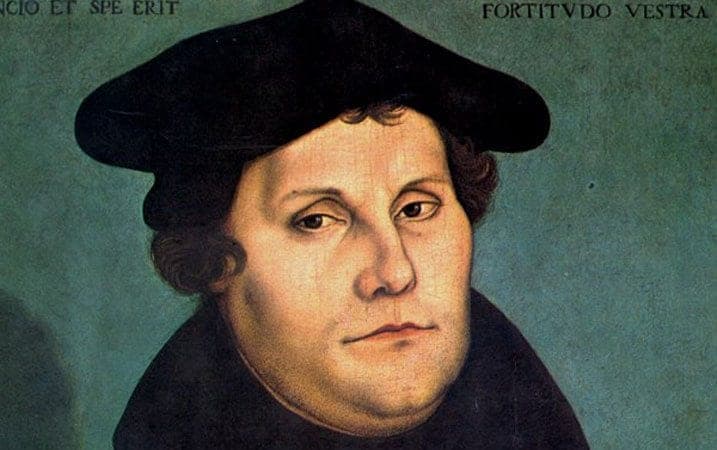Journalists traveling with the pope can expect some extraordinary in-flight entertainment. Pope Francis has made it a habit to take questions from media men and women, and part of the tradition is that while the journalist’s questions seem carefully prepared, His Holiness’ responses are not.
A remark used to be called “off the cuff” because the orator had taken a moment to scribble a few ideas on the cuff of his sleeve. Pope Francis’ cuffs, however, remain note-free.
His informality, spontaneity and open manner is refreshing, but one must not treat his in-flight comments as papal pronouncements. While they are usually good-natured and good-humored, they are rarely comprehensive, sometimes contradictory, and often confusing.
On his flight back from Armenia last weekend the Holy Father was quizzed about his upcoming trip to Lund in Sweden to commemorate the five hundredth anniversary of the Protestant Reformation. Tilmann Kleinjung from the national German radio station asked Pope Francis to acknowledge the “gifts of the Reformation” and whether the 1521 excommunication of Martin Luther might be lifted.
The Pope’s full remarks can be read here. Meanwhile, here are a few excerpts: “I think that the intentions of Martin Luther were not mistaken. He was a reformer. Perhaps some methods were not correct… in that time, the Church was not exactly a model to imitate. There was corruption in the Church, there was worldliness, attachment to money, to power…and this he protested.”
“Today, Lutherans and Catholics, Protestants, all of us agree on the doctrine of justification. On this point, which is very important, he did not err….” The pope concluded by observing that division exists within Lutheranism itself, that the ecumenical path is difficult, and that we must pray together and work together to help the needy.
No one would disagree that the ecumenical path is difficult, and most everyone would agree that the Protestant revolt was tragic. We would all also affirm with Pope Francis that, as Christian brothers and sisters, we should continue to work and pray together as much as possible.
It is the imprecision that accompanies Pope Francis’ warm and fuzzy talk that increasingly frustrates many Catholics. I asked Richard Ballard, a Catholic deacon who was a Lutheran pastor for twenty-five years, what he made of Pope Francis’ response.
He expressed some exasperation with the Holy Father, and made three main observations and objections.
The first is that the Protestant movement sparked by Martin Luther was not a legitimate reformation of the church. It was an open rebellion against the Catholic Church that ended not just in one schism, but in thousands. It also led to civil unrest, bloodshed, rebellion and revolution that tore Christendom apart.
In that respect, Ballard opines, Pope Francis’ opinion is simply wrong. Martin Luther’s intentions were mistaken.
Secondly, the Holy Father’s opinion that “today Lutherans and Catholics, Protestants, all of us agree on the doctrine of justification” is, quite frankly, naive. Everyone who cares about church unity applauds the 1999 Joint Declaration on the Doctrine of Justification, but to state that all Protestants and Catholics now agree is inaccurate.
I agree with Ballard’s assessment. I minister in the heart of America’s Bible Belt and I can assure you the majority of Protestants here most heartily do not agree with Catholics on the doctrine of justification.
Furthermore, most of them have never heard of the 1999 document between the Lutheran World Federation and the Catholic Church.
Lest one think that the only objections are from hillbilly preachers, Ballard holds two degrees in theology and a doctorate in pastoral counseling. I asked what he thought of the Holy Father’s surprising and heavily stressed statement that in the matter of justification Luther “did not err.”
“According to orthodox Catholic theology Luther did err,” he insisted. Luther argued for an exterior ‘imputed righteousness’ which means the baptized person remains a sinner, even after justification. In essence, God is merely pretending that the person is justified and sanctified, when he really isn’t,” he said.
“This is a major divergence from Catholic theology, which instead of “imputed righteousness” teaches ‘infused righteousness,’ in other words, the baptized person really is transformed and purified by God’s grace,” Ballard said.
“Furthermore, in the Joint Declaration, the Lutheran theologians still hold to their ‘imputed righteousness’ view.”
Ballard explained, “Another major difference is the understanding of the place of good works in the justification and sanctification of the baptized person. Catholics insist good works (empowered by God’s grace) are meritorious and that they contribute to the process of the soul’s salvation and purification. Lutherans still cling to the notion of salvation by “faith alone” and thus negate the importance of good works in the economy of salvation.”
He’s not the only one.
Pope Benedict XVI himself is not as optimistic as Pope Francis when it comes to the Joint Declaration. In a detailed clarification, then-Cardinal Joseph Ratzinger acknowledged that progress had been made and true points of convergence had developed.
However, in contrast to Pope Francis’ overly optimistic assessment, Ratzinger stated, “The Catholic Church is of the opinion that we cannot yet speak of a consensus such as would eliminate every difference between Catholics and Lutherans in the understanding of justification. The level of agreement is high, but it does not yet allow us to affirm that all the differences separating Catholics and Lutherans in the doctrine concerning justification are simply a question of emphasis or language.”
“Some of these differences concern aspects of substance and are therefore not all mutually compatible,” Ratzinger said.
The pope’s visit to Lund in October to commemorate the start of Protestantism should rightly affirm the shared faith of Catholics and Lutherans, and celebrate the ecumenical progress that has been made, but both sides should be clear about the significant obstacles to unity that still exist and make future progress based not only on charity, but also on clarity.















